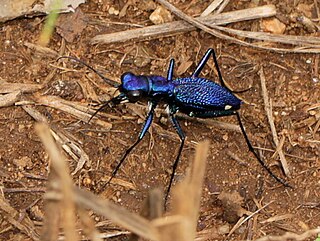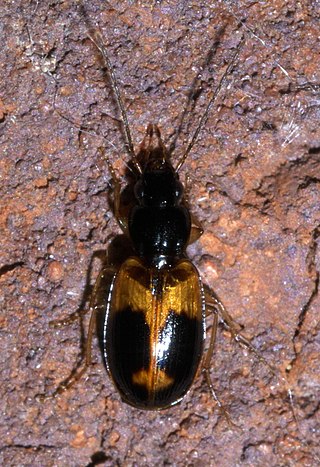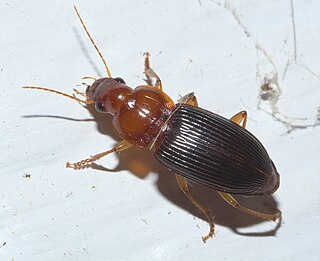Related Research Articles

Anthia is a genus of the ground beetle family (Carabidae) from Africa and Asia. Species of Anthia can spray a jet of formic acid up to 30 centimetres (12 in), which, if not treated, can cause blindness in animals that harass the beetles.
Peringuey's leaf-toed gecko, also known commonly as the salt marsh gecko, is a species of lizard in the family Gekkonidae. The species is endemic to South Africa.

Harpalus is a genus of ground beetle first described by Pierre André Latreille in 1802.

Louis Albert Péringuey MSc was a South African entomologist who specialised in Coleoptera and prehistory.

Brachinus is a genus of ground beetle native to the Nearctic, Palearctic, the Near East and North Africa. Beetles in this genus are commonly referred to as bombardier beetles. The genus contains the following species:

Acupalpus is a genus of insect-eating beetle species. Its representatives are found across Europe, Asia, and North America.

Lebia is a genus of predatory ground beetles. Common names include colorful foliage ground beetles and flat ground beetles. They are found worldwide and there over 700 species in 17 subgenera.

Macrocheilus is a genus of beetles in the family Carabidae, found in Africa and Asia.

Dromica is a genus in the beetle family Cicindelidae. There are at least 190 described species in Dromica, found in Africa.
Metaxymorphus is a genus in the ground beetle family Carabidae. There are more than 20 described species in Metaxymorphus, found in South Africa.
Singilis is a genus of beetles in the family Carabidae, first described by Jules Pierre Rambur in 1837.

Licininae is a subfamily of in the beetle family Cicindelidae. There are more than 80 genera and 1,800 described species in Licininae.

Monkey beetles are scarab beetles, a group of around 70 genera and 850 described species within the tribe Hopliini. The placement of this tribe within the family Scarabaeidae is uncertain between Melolonthinae and Rutelinae. Many species visit flowers for pollen and nectar, or browse on the petals. The beetles are important pollinators of Aizoaceae and Asteraceae in grazed and ungrazed areas, as well as many others.

Abacetus is a genus of beetles in the family Carabidae, distributed across Africa, Asia and Australia, with a single European species. It contains the following species:

Epicauta is a genus of beetles in the blister beetle family, Meloidae. The genus was first scientifically described in 1834 by Pierre François Marie Auguste Dejean. Epicauta is distributed nearly worldwide, with species native to all continents except Australia and Antarctica. Surveys have found the genus to be particularly diverse in northern Arizona in the United States. Few species occur in the Arctic, with none farther north than the southern edge of the Northwest Territories, Canada.

Chariesthes is a genus of longhorn beetles of the subfamily Lamiinae, containing the following species:

Harpalini is a tribe of a diverse group of ground beetles belonging to the subfamily Harpalinae within the broader family Carabidae. The tribe contains more than 1,900 species.

Lebiini is a tribe of ground beetles in the family Carabidae. There are more than 250 genera and 4,800 described species in Lebiini.

Sparrmannia is a genus of scarab beetles belonging to the subfamily Melolonthinae. Though the name was originally spelled as Sparmannia, a subsequent emendation of this spelling is in prevailing usage and therefore conserved under ICZN Article 23.9.1.

Mariazofia is a genus of ground-dwelling Afrotropical beetles in the family Tenebrionidae. They are among the largest of the darkling beetles. Like other genera within subtribe Molurina, adults of this genus engage in a behavior known as "substrate tapping", a form of sexual communication in which they produce vibrations by tapping their abdomen rhythmically on the ground to attract mates. Their common name, "tok-tok beetle" or "toktokkie beetle", is based on this behavior.
References
- ↑ "Aptinoderus Hubenthal, 1919". Catalogue of Life. Retrieved 2023-04-08.